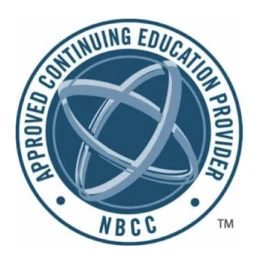What if the Most Effective Way to Build Trust Was to Tell the Truth Your Clients Have Been Avoiding?
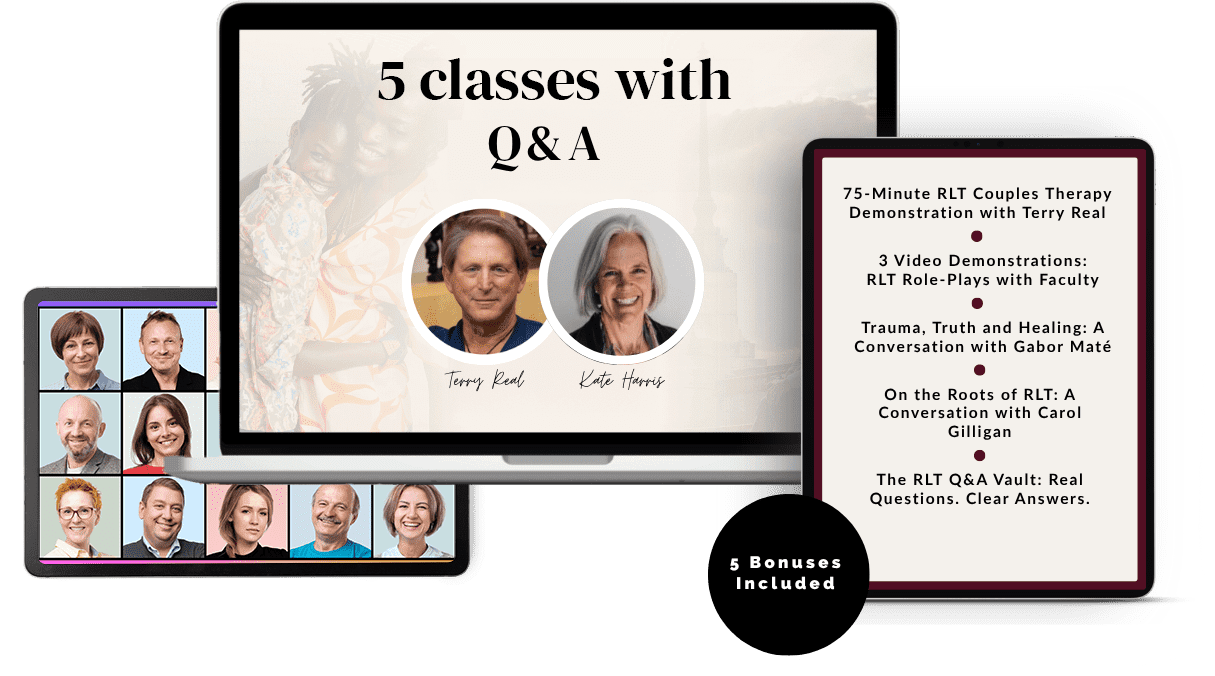

For the therapist or coach ready to use a trusted, precise method that brings clarity to even the most complex couples dynamic.
Every effective intervention starts with one thing:
A deep understanding of what’s really going on.
Get that right, and you’ve got a roadmap. A way to lead the session with purpose, direction, and a real chance at repair. Miss it, and you risk circling surface issues, managing reactivity, and never quite touching the core – session after session..
That kind of clarity is rarely handed to you.
In sessions filled with blame, shutdown, or dead silence, finding the truth beneath the layers of pain and resentment is anything but straightforward.
But what if, even in your toughest sessions, you could…




Cut through the noise. Diagnose the pattern. And intervene with precision.
It’s exactly what Terry Real has been doing for over 30 years, stepping into highly reactive rooms and naming what’s really going on beneath the surface.
Not by waiting for insight to emerge. But by using a clear, structured method that shows you what to look for, what to say, and how to lead the work forward.
That method is built on 8 powerful diagnostic lenses. Each one revealing a different piece of the couple’s story.
The 8 Diagnostic Lenses of Relational Life Therapy
At the heart of RLT Level 1 is a structured approach to what we call waking up the client – helping them recognize the real role they play in their relational dynamic. To do that effectively, you’ll learn to assess each couple through 8 specific diagnostic lenses that bring clarity to even the most complex relationships.
Presenting Problem(s)
Clarify each partner’s core complaint. RLT always treats two individuals, never just
a relationship, so every case begins with identifying two distinct narratives.
Preconditions
Screen for issues that must be addressed before relational work can begin. This includes factors like active addiction, psychiatric instability, or ongoing abuse.
Stance, Stance-Dance
Identify each partner’s relational stance and the repetitive loop they co-create. This lens reveals the dynamic that keeps them stuck.
Losing Strategies
Spot the five automatic behaviors that derail intimacy. These include being right, controlling, unbridled self-expression, retaliation, and withdrawal.
Relational Grid
Map each partner’s relational posture by assessing their self-esteem and boundaries – particularly how grandiosity or shame shows up in the dynamic.
Family Role
Explore which childhood survival role each partner adopted, such as the hero, scapegoat, or lost child, and how that role influences their adult relationships.
Latent/Blatant Typology
Assess how power is expressed in the relationship. Latent partners tend to be indirect or passive, while blatant partners are more overt, dominant, or grandiose.
Social Context
Account for broader cultural factors like gender, race, class, & privilege. This lens helps you recognize how social identity shapes power, expectation, & behavior in the relationship.
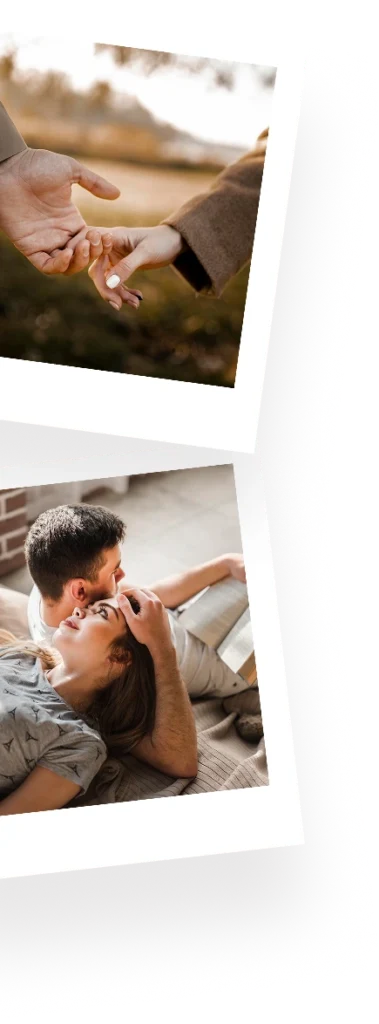



Relational Life Therapy Level 1
RLT Level 1 is a five-module online training that brings you into the room with Terry Real as he teaches the 8 diagnostic lenses behind Relational Life Therapy. You’ll explore how to assess couples through reactive patterns, family roles, power dynamics, shame, and social context – and learn how to use this framework in your own practice.
Training includes recorded teaching, real demonstrations, and guided integration to help you build fluency and apply the method confidently in practice.
Whether you’re looking to go deeper in your couples work, or want a diagnostic map you can rely on when sessions go off track, RLT Level 1 offers a clear, practical foundation to guide your approach.
By the end of this program, you’ll be able to:
Lead with clarity
Know exactly what to track & how to intervene.
Stay grounded
Hold complexity without absorbing the chaos.
Diagnose with precision
See what’s really driving the dysfunction.
Work with reactivity
Address power, shame, disconnection head-on.
Guide the process
Interrupt patterns and move couples forward.
Speak hard truths
Confront skillfully while staying connected.
Level up your practice
Shift how you see and work with couples.
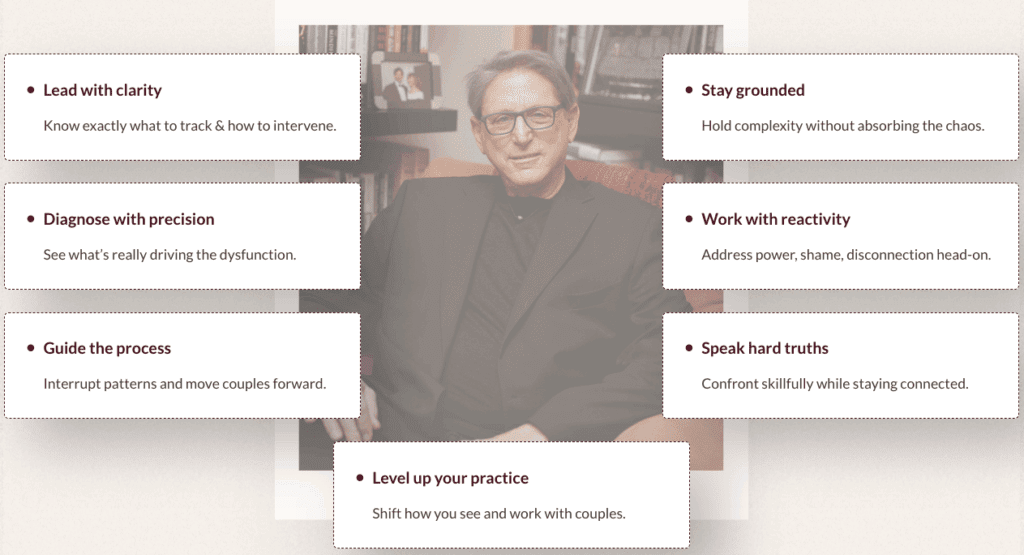

The Curriculum
Module 1: The Three Phases of RLT and How They Work
Before you can change what’s happening between two partners, you need to know what you’re looking at. This opening module reframes the entire approach to couples therapy by introducing the three foundational phases of RLT and how they work together to generate transformation.
You’ll also learn why conventional neutrality can backfire, and what it means to diagnose relational dynamics rather than individual pathology.
Highlights include:
- How to identify the true starting point for change in any couples session
- Why traditional neutrality often leads to therapeutic paralysis, and what to do instead
- The three phases of the RLT method, and how they create a clear arc for relational repair
- How to view the couple as a living system, rather than two parallel individuals
- The difference between individual diagnosis and relational diagnosis, and why it matters
- Why RLT leads with truth-telling, and how that creates the conditions for deep emotional healing
Module 2: Building a Clearer Diagnostic Picture from the Start
Once you understand the RLT model, the next step is learning how to apply it in real time. Module 2 introduces the first three lenses of relational diagnosis and shows you how to gather targeted, in-the-moment data that reveals each partner’s stance and the deeper patterns beneath the conflict.
Highlights include:
- How to surface two distinct presenting problems and why this matters for every session that follows
- The three preconditions that must be ruled out before intimacy work can begin
- How to spot each partner’s stance and decode the feedback loop they co-create
- Why just listening won’t cut it and what it means to gather data like a relational clinician
- Learn how to assess a couple’s dynamic from what’s said, what plays out in the room, and what it stirs in you as the therapist or coach
- Why staying in the present moment yields more useful data than digging endlessly into the past
Module 3: Spotting the Patterns That Keep Clients Stuck
Go deeper into the heart of the couple’s dysfunction by decoding their reactive strategies and early conditioning. This module introduces the concept of the Adaptive Child and the five Losing Strategies, giving you a structured way to name each partner’s reactivity without shame or blame.
Highlights include:
- How to help clients shift from defensive patterns to a more open, relational stance
- Why insight alone won’t lead to change without first confronting what’s in the way
- The five Losing Strategies that keep couples stuck in cycles of conflict and disconnection
- How to identify and name Adaptive Child responses in the moment
- A language for describing reactivity that clients can actually hear and work with
- Why the goal isn’t neutrality, but compassionate confrontation that leads to movement
Module 4: Uncovering the Deeper Structures Driving Disconnection
Zoom out to consider the larger forces shaping the couple’s dynamic. This module takes you deeper into the structural forces shaping their behavior. You’ll learn how to use the Relational Grid to assess self-esteem and boundaries, and how early family roles continue to shape how each partner shows up in their relationships.
Highlights include:
- How to spot the intersection of self-esteem and boundaries using the four quadrants of the Relational Grid
- The signs your client is stuck in grandiosity, shame, enmeshment, or withdrawal
- How to shift your approach based on where your client sits in the grid – and how to make that call in real time
- How childhood roles like the “hero,” “lost child,” or “scapegoat” silently carry into adult relationships
- What to look for when a client’s worth hinges on being needed, and how to help them let go
- How to bring family-of-origin insights into the room without turning the session into individual therapy
Module 5: Power, Culture, and the Leverage to Create Change
In this final module, Terry introduces the last two diagnostic lenses – Blatant/Latent Power and Social Context – giving you the complete RLT assessment framework.
From there, you’ll learn how to use this full map to build leverage, confront stuck patterns with clarity, and motivate even resistant clients to move towards change.
Highlights include:
- How to spot latent power in the room, and why the quieter partner often holds more influence than it seems
- A structured way to work with power imbalances without collapsing into blame or rescue
- How social identity shapes relational dynamics, and why it must be part of any accurate diagnosis
- A look at Terry’s newest addition to the model, the Social Context lens, and how it sharpens your clinical approach
- How to name what’s really at stake for clients in a way that motivates rather than shames
- Why leverage is essential to change, and how to build it from the truth of what you see
Plus 5 special bonuses…
Bonus 1
75-Minute RLT Couples Therapy Demonstration with Terry Real
The fastest way to internalize the 8 diagnostic lenses is to see them in action.
Observe Terry conduct a real Phase 1 intervention with a couple, showing how he gathers data, reads the system, and begins to name the dynamic. This demonstration bridges the gap between theory and practice so you can better translate the model into your own sessions.
Bonus 2
3 Video Demonstrations:
RLT Role-Plays with Faculty
In these demonstration clips, experienced RLT faculty role-play common couples dynamics and show how a practitioner can navigate them using Phase 1 data-gathering tools.
You’ll see the subtle moves, from tracking interaction patterns to asking the right questions, that help reveal the deeper structure beneath the surface conflict.
Bonus 3
Trauma, Truth and Healing:
A Conversation with Gabor Maté
In this 60-minute interview, Terry sits down with Dr. Gabor Maté for an intimate dialogue on the relationship between trauma, emotional repression, and relational repair.
Together they explore the physical and relational toll of unresolved trauma and how both therapists and clients can begin to heal.
Bonus 4
On the Roots of RLT:
A Conversation with Carol Gilligan
Go behind the scenes of RLT’s origin story in this rare discussion between Terry and world-renowned feminist psychologist Carol Gilligan.
From the influence of relational ethics to the evolving role of gender in therapy, this conversation offers deeper insight into the intellectual foundations that shaped RLT and why it remains a timely, radical approach to working with couples.
Bonus 5
The RLT Q&A Vault:
Real Questions. Clear Answers.
Ever wish you could sit in on office hours w/ senior RLT faculty? This curated collection features some of the most insightful questions from past RLT Level 1 cohorts covering everything from trauma boundaries to building leverage, managing stuck sessions, and adapting RLT to different contexts.
2104
practitioners trained in RLT Level 1
18+ hours
of clinical training and bonus content
25+
countries represented by past students
Your RLT trainers
Terry Real, LICSW



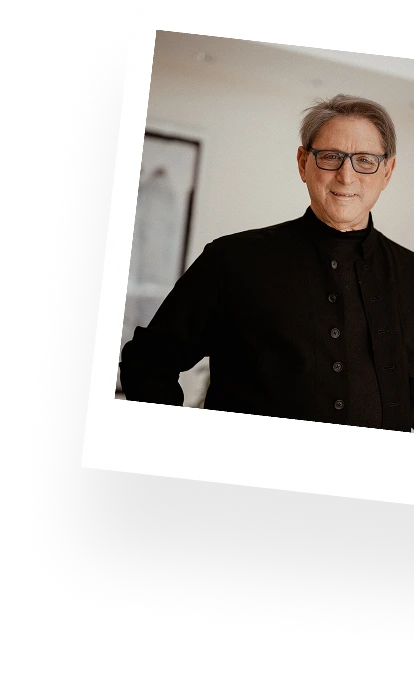


For over three decades, Terry Real has sat across from couples on the brink – yelling, shutting down, ready to walk away. And session after session, he’s helped them come back.
Not by sitting back and listening. But by leaning in with radical honesty, fierce compassion, and the clarity to name exactly what’s happening in the room. That’s what Terry is known for. He’s the therapist other therapists turn to when nothing else is working, the one who can untangle even the most entrenched dynamics and help people change for good.
To make his method teachable, Terry distilled everything he knows into a clear model called Relational Life Therapy (RLT), now taught to thousands of clinicians and coaches through the Relational Life Institute. Terry is also the author of four books, including I Don’t Want to Talk About It, the first book ever published on male depression, and the New York Times bestseller Us: Getting Past You and Me to Build a More Loving Relationship.
Through RLT Level 1, you’ll gain the same diagnostic foundation Terry has used in real rooms with real couples so you can stop circling the surface and start changing lives.














Kate Harris, PhD
(NH, ME, PSYPACT) | Faculty, Relational Life Institute
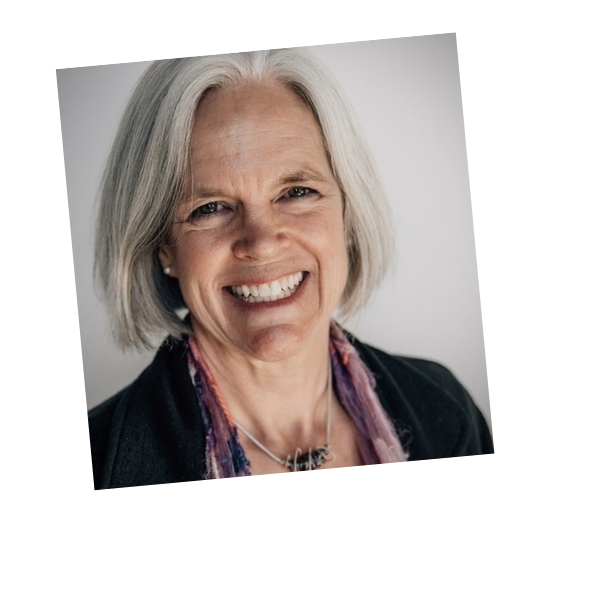

For more than two decades, Kate Harris has guided couples and individuals toward deeper connection and clarity. She discovered Relational Life Therapy in 2015, and after attending an RLT bootcamp with her husband in 2017, witnessed firsthand how the method deepened their 32-year marriage. That experience led her to seek certification, and in 2018 she became a founding faculty member at the Relational Life Institute.
Kate brings together RLT with Internal Family Systems, mindfulness, values-based coaching, and spiritual inquiry.
In this training, you’ll also learn from her through a series of live-recorded deep dives where she helps therapists translate the eight diagnostic lenses into powerful, real-world clinical tools. Her grounded, compassionate teaching supports clinicians in bridging theory and practice, making each session both effective and relationally present.


What Therapists Say About Learning from Terry Real
Try Now. Decide Later.
We’re confident that once you complete RLT Level 1, you’ll walk into couples sessions with more clarity, structure, and clinical confidence than ever before.
But if you go through the training and feel it hasn’t meaningfully improved the way you see and assess couples, simply email us within 14 days of your purchase, and we’ll refund you in full. No questions asked.
This is your risk-free way to experience the efficacy of the RLT method, and decide for yourself if it belongs in your practice.
When you join RLT Level 1, you’ll get:
- 5 core training modules taught by Terry Real through pre-recorded video
- Recorded deep-dive sessions with faculty member Kate Harris, PhD
- 75-minute full-length RLT couples therapy session with Terry Real
- 3 video demonstrations of role-plays led by RLT faculty
- 60-minute interview with Dr. Gabor Maté and Terry Real on trauma and relational healing
- 60-minute conversation with Dr. Carol Gilligan and Terry Real on the origins of RLT
- Curated Q&A Vault from past student cohorts
- Lifetime access to all training materials in your private student portal
Pay in Full
$395
3 x Monthly Payments
$137 × 3
What Therapists Say About Learning from Terry Real
Frequently Asked Questions
I’m not a therapist. Can I still apply this as a coach?
Yes. RLT Level 1 is designed for both therapists and coaches. In fact, many coaches already use RLT’s principles to deepen their client work. If you support people in relational growth, then this training will serve you well.
I only do individual therapy. Will this still help me?
Absolutely. While RLT is rooted in couples work, the diagnostic tools and confrontational techniques are just as powerful in individual therapy, especially with clients working through relational trauma, boundary issues, or recurring patterns in relationships. You’ll walk away with new language, sharper insights, and strategies you can use immediately – even one-on-one.
Will this really work with my most stuck or high-conflict couples?
Yes. Terry built RLT as a direct response to the limitations of traditional couples therapy. He’s often known as the “last resort” therapist, called in when nothing else has worked. This method was designed for the toughest cases: high-conflict couples, chronic resentment, emotional shutdown, infidelity, even situations on the brink of divorce.
What if I don’t get the results I hoped for?
We offer a risk-free window so you can experience the first module and decide if the training is right for you.
If after completing Module 1, including the live Q&A with Dr. Kate Harris, you don’t feel the program delivers the clarity or value you expected, simply email us within 48 hours of the module’s release and we’ll refund you in full. No hassle. No hard feelings.
Will I need to practice this right away in sessions to benefit?
You don’t have to, but we recommend it. The best way to build fluency with the RLT model is to start experimenting with the tools in session. Even applying one lens at a time can create powerful shifts. You’ll be surprised how quickly it clicks.
How is this different from other methods I’ve already studied (like EFT, Gottman, IFS)?
RLT stands apart in both philosophy and practice. It goes beyond managing conflict or building communication skills. It’s about calling out the core relational dynamics that keep couples stuck, and intervening with bold, compassionate truth-telling.
Where many methods stay neutral, RLT teaches you to lead. Where others rely on emotional safety first, RLT often works in real-time, even in the heat of the moment.
We hold deep respect for other modalities, and many of our students integrate RLT seamlessly with their existing training.
Does this include trauma work? Or is that taught later?
RLT Level 1 is trauma-informed but it does not teach the actual trauma work. That’s covered in Level 2.
Why? Because RLT takes trauma seriously. Before teaching you how to guide clients through deep healing, Level 1 ensures you know how to “wake them up” so you can interrupt dysfunctional patterns, expose adaptive child strategies, and get them ready for deeper work.
Without this foundation, trauma work in couples therapy can be ineffective, or worse, harmful. That’s why we build it in phases.
Can I really ‘diagnose’ couples this fast?
Not at first, and that’s okay. Terry may be able to identify root issues in a single session, but he invented the method and has 40+ years of experience.
As a new practitioner, you’re encouraged to take your time. RLT teaches you how to layer 8 diagnostic lenses over time, building a rich, nuanced picture of what’s really going on beneath the surface. With practice, precision comes.
Is this enough to start using RLT with clients, or do I need to complete the full certification?
Level 1 is a complete and self-contained training. Many graduates have made immediate improvements in their client outcomes after completing just this course.
That said, RLT is a deep and evolving model, and if you choose to go further, Level 2 and full certification are always available to you.
When you join RLT Level 1, you’ll get:
- 5 core training modules taught by Terry Real through pre-recorded video
- Recorded deep-dive sessions with faculty member Kate Harris, PhD
- 75-minute full-length RLT couples therapy session with Terry Real
- 3 video demonstrations of role-plays led by RLT faculty
- 60-minute interview with Dr. Gabor Maté and Terry Real on trauma and relational healing
- 60-minute conversation with Dr. Carol Gilligan and Terry Real on the origins of RLT
- Curated Q&A Vault from past student cohorts
- Lifetime access to all training materials in your private student portal
Pay in Full
$395
3 x Monthly Payments
$137 × 3
Considering RLT Certification?
RLT Level 1 is the first step of the full certification pathway. If you choose to continue later, your full Level 1 tuition will be credited toward the certification.



